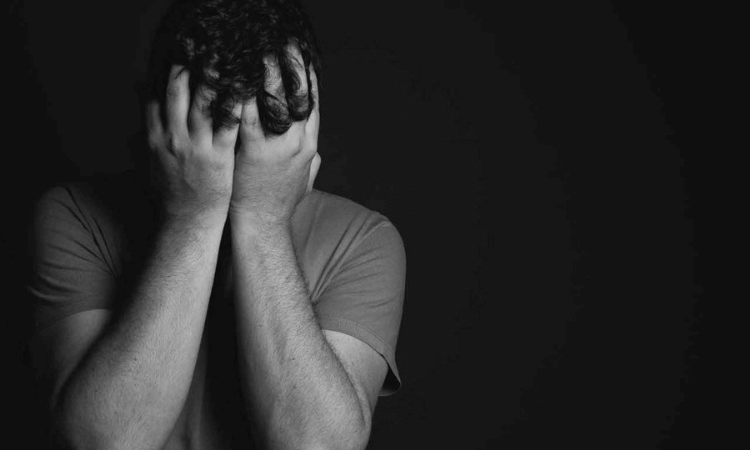Mental health is key to your overall well-being, affecting how you handle stress, relate to others, and make choices. From anxiety to depression, there are many serious mental health conditions. But with the right support you can manage, and even overcome, yours.
At Recovery In Tune, we’re here to help you achieve better mental health. Learn more about how these disorders manifest and how you can get started on your road to mental health recovery today.

About Mental Health Disorders
Mental health includes your emotions, thoughts, and social wellness. It affects how you think, feel, and act every day.
Common disorders can affect anyone, no matter their age or background. But the right support from mental health professionals can significantly improve your mental health and ability to cope with life’s challenges.
Recovery In Tune is a mental health and substance abuse treatment center that aims to give you the tools you need to improve your mental health — and your life.
Why Do People Form Mental Health Disorders?
Mental health disorders develop over time due to a combination of factors that affect your brain and emotions. These factors can be genetic, environmental, or related to brain chemistry.
While some people may have a higher risk due to their family history or life experiences, these factors can disrupt how your brain regulates emotions, thoughts, and behaviors, leading to mental health conditions.
Causes of Mental Health Problems
Genetics can play a key role in developing a mental health condition, as these can run in families. If blood relatives have had any mental health disorders, you may be more likely to develop similar conditions.
Brain chemistry is also key, as neurotransmitters like serotonin and dopamine are vital for regulating emotions. When these chemicals are out of balance, communication between brain cells becomes impaired, leading to mood disorders and other mental health conditions.
Environmental factors, such as exposure to stress or toxins before birth, can also affect brain development and functioning.
Risk Factors for Mental Health Conditions
Although risk factors don’t necessarily cause mental health conditions, they can significantly increase the chances of someone developing one.
Risk factors for someone developing a mental health condition include:
- A history of mental illness among family members
- Chronic medical conditions
- Traumatic events
- Substance use
- Lack of access to mental health care and support from providers or caregivers
- Social isolation
- Adverse early childhood experiences, such as neglect or exposure to stressors
- Poor physical health or struggles with daily life and well-being
Scope of Mental Health Disorders
Mental health disorders can impact anyone, regardless of age, gender, or background. Studies show that mental health affects both men and women, and can begin at a young age.
Statistics showing who can be affected by mental health issues in America include:
- Women often experience depression, anxiety, and eating disorders.
- Men are more likely to face substance abuse and antisocial personality disorders.
- About 1 in 5 adults and adolescents in the U.S. have a mental health condition.
- Half of all mental illnesses start by age 14.
- Suicide, frequently linked to mental health problems, is the 10th leading cause of death.
Signs of a Mental Health Condition
Mental health disorders can present in many ways and it’s easy to miss the connection between our behaviors and their underlying causes.
Common signs include:
- Turning to alcohol or drugs
- Withdrawing socially
- Delusions or hallucinations
- Excessive fear, anxiety, or worry
- Fatigue or trouble sleeping
- Feeling isolated, sad, or hopeless
- Anger or irritability
- Fixation on appearance or weight
- Problems completing daily tasks
- Extreme shifts in mood
- Thoughts of self-harm or suicide
In children, signs may include:
- Declining performance in school
- Loss of interest in activities
- Intense worry
- Frequent tantrums, defiance, or aggression
- Difficulty staying focused or sitting still
- Nightmares or disturbed sleep
If you notice any signs in yourself or in a loved one, we’re ready to guide you toward the right support.

Now is the perfect time to begin to heal!

Common Types of Mental Health Disorders
Mental health disorders include a range of conditions that affect mood, thinking, and behavioral health. Many of these can co-occur with others or with substance use disorders, so treatment must be unique to each person.
Anxiety disorders go beyond temporary worry or fear. For people with these disorders, anxiety can worsen over time, interfering with daily life. Common types include generalized anxiety disorder, panic disorder, obsessive compulsive disorder (OCD), social anxiety disorder, and phobias.
Depression is a serious mood disorder that impacts daily activities like sleep, eating, and working. It causes persistent feelings of sadness or loss of interest.
Different forms of depression include major depressive disorder, seasonal affective disorder, and postpartum depression.
Bipolar disorder causes extreme mood swings, from depressive episodes to manic periods of heightened energy or irritability. There are three main types: bipolar I, bipolar II, and cyclothymic disorder.
Each type involves shifts in mood, energy, and self-esteem, making daily life challenging.
PTSD develops after experiencing or witnessing a traumatic event. While fear is a natural response to danger, PTSD occurs when the symptoms — such as flashbacks, nightmares, and severe anxiety — persist long after the event.
Schizophrenia affects how a person thinks, feels, and behaves, often leading to difficulty distinguishing between reality and hallucinations or delusions.
As one of the more serious psychotic disorders, it requires ongoing treatment. But with help, people can improve their daily functioning and enjoy a rich, independent life.
Eating disorders involve unhealthy preoccupations with food, body weight, and shape. Common types include anorexia nervosa, bulimia nervosa, and binge-eating disorder. These conditions are often life-threatening, but can be treated with proper care.
Disruptive behavior disorders, such as oppositional defiant disorder (ODD) and conduct disorder, involve patterns of defiant, hostile behavior toward authority figures.
Antisocial personality disorder, a dissocial disorder, can lead to reckless, manipulative, or harmful behavior toward others.
Complications of Untreated Mental Health Conditions
When mental health disorders go untreated, they can impact every part of life. Over time, symptoms can worsen, affecting your emotional well-being, relationships, and ability to function at work or school.
Untreated disorders can also lead to physical health problems and, in severe cases, result in self-harm or suicidal thoughts. While early treatment goes a long way in preventing long-term harm, treatment at any stage can improve your mental health.
Mental Health Treatment in Davie, Florida
At Recovery In Tune in Florida, we offer a range of mental health treatment options designed to meet your needs. Our personalized care programs provide the support you need to regain control and improve your quality of life.
Our Mental Health Intensive Outpatient Program (MH-IOP) is designed to help you manage primary mental health conditions, which may be co-occurring with substance use.
This program provides partial day treatment with group therapy and individual counseling, helping you stabilize your mental health while transitioning to more independent living.
Our Partial Hospitalization Program (PHP) offers a higher level of care for those who need more support than traditional outpatient services.
Through therapies like cognitive behavioral therapy (CBT) and trauma therapy, our PHP helps you manage mental health challenges while balancing your daily responsibilities.
Living with an anxiety disorder can feel overwhelming, but you don’t have to manage it alone. At Recovery In Tune, we offer specialized mental health services for anxiety disorders, such as generalized anxiety disorder, panic disorder, and social anxiety disorder.
Our services help you identify your anxiety triggers and develop effective coping skills to reduce its impact on your life.
Depression can make even simple daily tasks feel impossible. Our goal is to help you uncover the root causes of your depression and equip you with the tools to improve your quality of life.
Mood disorders, like bipolar disorder or persistent depressive disorder, can cause extreme emotional highs and lows that disrupt your life.
Our mood disorder treatment focuses on stabilizing your mood through a combination of medication, psychotherapy, and holistic approaches to manage your symptoms and regain life balance.
Personality disorders can make it difficult to manage relationships, emotions, and everyday life.
At Recovery In Tune, our personality disorder treatment plans combine medication, individual therapy, and family counseling to help you improve emotional regulation and develop healthier relationships.
Trauma can leave deep emotional scars, and post-traumatic stress disorder (PTSD) may disrupt your ability to feel safe, connected, and present.
Our trauma and PTSD treatment program offers specialized therapies, mindfulness, and stress management techniques to help you work through your trauma in a supportive environment.
Get Supportive Mental Health Care at Recovery In Tune
If you or a loved one is living with a mental health disorder, Recovery In Tune provides the expert care and compassionate support you need to take back control of your life.
Our tailored treatment programs are designed to address not only the symptoms of mental health conditions but also the underlying factors that affect your well-being.
With the right care, you can find healing and regain a sense of balance. Recovery is possible, and we’re here to walk with you every step of the way. Contact us today to start your journey toward better mental health.
Mental Health FAQs
Mental health refers to your emotional, psychological, and social well-being. It affects how you think, feel, and act, influencing how you handle stress, relate to others, and make decisions. Good mental health is essential for overall well-being and quality of life.
Mental health issues can be caused by a combination of factors, including genetics, brain chemistry, trauma, and life experiences. Stress, substance use, and environmental factors can also contribute to the development of mental health disorders.
Yes, genetics can play a role in mental health issues. If mental health disorders run in your family, you may have a higher likelihood of developing one.
Yes, many mental health conditions can be managed or overcome with the right treatment. Therapy, medication, and lifestyle changes can help you manage symptoms and improve your quality of life.
Sources
- Centers for Disease Control and Prevention. “About Mental Health.” Retrieved from: https://www.cdc.gov/mental-health/about/?CDC_AAref_Val=https://www.cdc.gov/mentalhealth/learn/index.htm. Accessed October 18, 2024.
- Cleveland Clinic. “Antisocial Personality Disorder.” Retrieved from: https://my.clevelandclinic.org/health/diseases/9657-antisocial-personality-disorder. Accessed October 18, 2024.
- Cleveland Clinic. “Oppositional Defiant Disorder.” Retrieved from: https://my.clevelandclinic.org/health/diseases/9905-oppositional-defiant-disorder. Accessed October 18, 2024.
- Mayo Clinic. “Mental Illness.” Retrieved from: https://www.mayoclinic.org/diseases-conditions/mental-illness/symptoms-causes/syc-20374968. Accessed October 18, 2024.
- National Institute of Mental Health. “Anxiety Disorders.” Retrieved from: https://www.nimh.nih.gov/health/topics/anxiety-disorders. Accessed October 18, 2024.
- National Institute of Mental Health. “Attention-Deficit Hyperactivity Disorder (ADHD).” Retrieved from: https://www.nimh.nih.gov/health/topics/attention-deficit-hyperactivity-disorder-adhd. Accessed October 18, 2024.
- National Institute of Mental Health. “Bipolar Disorder.” Retrieved from: https://www.nimh.nih.gov/health/topics/bipolar-disorder. Accessed October 18, 2024.
- National Institute of Mental Health. “Depression.” Retrieved from: https://www.nimh.nih.gov/health/topics/depression. Accessed October 18, 2024.
- National Institute of Mental Health. “Eating Disorders.” Retrieved from: https://www.nimh.nih.gov/health/topics/eating-disorders. Accessed October 18, 2024.
- National Institute of Mental Health. “Post-Traumatic Stress Disorder (PTSD).” Retrieved from: https://www.nimh.nih.gov/health/topics/post-traumatic-stress-disorder-ptsd. Accessed October 18, 2024.
- National Institute of Mental Health. “Schizophrenia.” Retrieved from: https://www.nimh.nih.gov/health/topics/schizophrenia. Accessed October 18, 2024.
- National Library of Medicine. “Information about Mental Illness and the Brain.” Retrieved from: https://www.ncbi.nlm.nih.gov/books/NBK20369/. Accessed October 18, 2024.